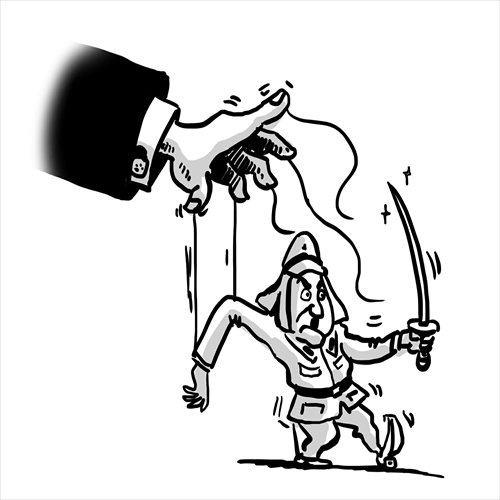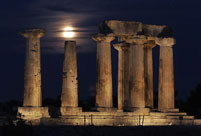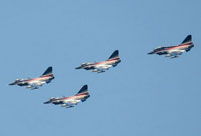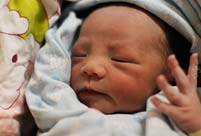 6 Chinese nurses win Florence Nightingale Medal
6 Chinese nurses win Florence Nightingale Medal
 Lady of mystery: Female SWAT team in prison disclosed
Lady of mystery: Female SWAT team in prison disclosed
 Tibetan ethnic costumes presented during tourism festival in NW China
Tibetan ethnic costumes presented during tourism festival in NW China
 Weekly selection of world photos (Aug.19-Aug.24)
Weekly selection of world photos (Aug.19-Aug.24)
 Boy pushed to air, 2 meters high by fountain in Huibei
Boy pushed to air, 2 meters high by fountain in Huibei
 Vintage cars exhibited at auto cultural festival in China's Shanxi
Vintage cars exhibited at auto cultural festival in China's Shanxi
 Military plane crashes in NE China
Military plane crashes in NE China
 Baby born to save his sister - the story of a savior sibling
Baby born to save his sister - the story of a savior sibling
 Those embarrassing copycat buildings
Those embarrassing copycat buildings
 |
| Illustration: Liu Rui/GT |
Just as US politicians adopt two distinct strategies of engagement with and containment of China, they also have two different ways of "exploiting" and "controlling" Japan.
In the last decade, the US has taken advantage of Japan to gain strategic interests in the Asia-Pacific region and the world at large. However, if Japan gets too active in the economic or security arenas or nationalist forces become restless, the US will be bound to impose more control.
General Douglas MacArthur was the initiator of the "controlling" strategy toward Japan. MacArthur oversaw the postwar occupation of Japan and carried out large-scale reforms there, including the formulation of the Peace Constitution.
Nonetheless, the US failed to thoroughly reform Japan due to changes in the international situation after WWII. The urgent need to turn around the Korean War even required Tokyo to rebuild its army to offer assistance, which, however, encountered protests from Japan's pacifist factions.
Out of frustration, the White House asked the Japanese government to assemble veterans to form the Japan Self Defense Forces (JSDF) with a variety of military services. It is fair to say that the well-equipped forces are a fruitful result of Washington's exploitation of its East Asian ally.
The US has long been cultivating the JSDF in a meticulous and crafty manner, looking to have it play a defensive role.
The JSDF ranks among the best in terms of antisubmarine and mine-clearing capacities around the world, which will help Washington frame the "first island chain" to contain China and be a vanguard for the US navy.
Japan has sent refueling vessels to back up the anti-terror battle since the Afghan War broke out. Obviously, the White House has long been labeling the JSDF as a supporter in mine clearance as well as refueling. Even the most advanced Aegis missile destroyer was only equipped with anti-ballistic missiles instead of offensive weaponry.
Japan, on the contrary, is not content with its supporting role in terms of military buildup. Recently, it has been obsessed with purchasing the fifth generation of F35 fighter jets, building several helicopter destroyers of the same displacement as small-scale aircraft carriers, and secretively developing missile technology.
Since the beginning of 2012, the Japanese government has increased the budget for national defense. It is estimated that its defense budget for 2014 will see a rise of 2.9 percent year-on-year.
On the one hand, Tokyo's military buildup will curb the rise of China to a certain degree, and on the other, the US arms dealers will make more profits. The US forces in Japan reportedly have considered "borrowing" the helicopter carrier Izumo, launched earlier this month, when a conflict occurs in the Asia-Pacific region.
There are differences among the strategists in the Pentagon. Some of them hold that Japan, a nation that has never reflected on its war crimes and has long engaged in territorial disputes with its neighbors, will exert a negative influence upon the situation in Northeast Asia and the US pivot to Asia strategy.
For the US, Japan is the most critical strategic country in East Asia. With an intention to forge a new pattern of relations with China, Washington does not want to confront the rising power directly. It also aims at establishing closer trilateral cooperation with Japan and South Korea.
Nevertheless, Tokyo's intensified tensions with Beijing and Seoul pose a headache for the Obama administration.
More importantly, Japan's ever growing military capacities will make its alliance with the US gradually meaningless in the long term.
No one can predict who will become the target of an aggressive Japanese army, as the Chinese people will never forget the Nanjing Massacre and Americans will never leave behind the attack on Pearl Harbor.
 August Full Moon celebrated across Greece
August Full Moon celebrated across Greece Top 10 Chinese provinces for the well-heeled
Top 10 Chinese provinces for the well-heeled  Fan Bingbing poses for Malaysian magazine Citta Bella
Fan Bingbing poses for Malaysian magazine Citta Bella Preview of Moscow air show
Preview of Moscow air show Wild dream: Hell-like training for bodyguard
Wild dream: Hell-like training for bodyguard  Zhang Xinyi covers COSMOPOLITAN
Zhang Xinyi covers COSMOPOLITAN China’s weekly story
China’s weekly story  The story of a savior sibling
The story of a savior sibling A collection of bizarre rooftop buildings around China
A collection of bizarre rooftop buildings around China 100th birthday of 'Little Mermaid'
100th birthday of 'Little Mermaid' Escort taskforce holds live-fire training
Escort taskforce holds live-fire training Death toll climbs to 76 in flood of NE China's Fushun
Death toll climbs to 76 in flood of NE China's Fushun Nokia's Global Headquarters: visiting a declining empire
Nokia's Global Headquarters: visiting a declining empire 2013 Taiwan Int'l Tourism Expo kicks off in Taipei
2013 Taiwan Int'l Tourism Expo kicks off in Taipei Photo story: Take a gap year
Photo story: Take a gap yearDay|Week|Month